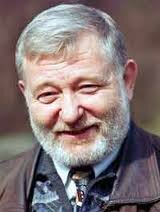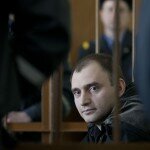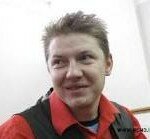
This is the first part of the interview, recorded in May 2012 – after 16 years of a hunger strike led by Yuri Hadyka and Vyacheslav Sivchyk while they were imprisoned in Minsk’s Volodarka. How does Yuri Hadyka, from the current political perspective, evaluate political arrests that took place in 1996, their hunger strike, and the behaviour of the prison guards? Did they, as the first political prisoners under Lukashenko’s regime, have ever predicted that their history is the beginning of long years of repression in Belarus?
On Optimism
Of course it was our conscious decision to start a hunger strike. We have taken this decision, understanding that one needs perseverance to continue hunger strike for a long time, and we were convinced that such desperate cases of prisoners’ hunger strikes will never occur in the future. At that time it was some kind of optimism.
My wife went to the office of the Belarusian Popular Front, and there was no leadership at all. Pazniak left, Vyachorka – arrested, Me – arrested, Sivchyk – arrested. Only Ivashkevich was there. Then she prepared the posters “Freedom for Hadyka”, hung them on the chest and her back and walked on the streets like that. She has organized the whole campaign – she gathered signatures among MPs to release me. Sharecky, Bogdankevich, Vasily Bykov and many others signed up for me. But back then we had different relationship with Russia, that was far more democratic than now while run by Putin.
On Yeltsin
I respect Yeltsin. I knew him a little bit. We stumbled upon each other in 1991. Completely by accident! It was bad weather, and me and my wife were going to visit some of our friends. We went to friends in Riga. We were walking up the empty street, and then we saw a group of people. They came closer and we saw Yeltsin! He was with his wife and a bodyguard.
We greeted each other. My wife introduced me, and said that I’m one of the chairmen of the Belarusian Popular Front. Yeltsin said, “We’ll be fighting together for democracy.” And we parted. I immediately told my wife that I need to write to Yeltsin and seek his support.
I managed to reach Yeltsin. My teacher, Sergei Ivanovich Anisimov, was a member of the Soviet Academy of Sciences, he was on good terms with the then Vice President of the Academy – Vielichov, who helped me to reach Yeltsin.
And my wife managed to get through to the Yeltsin’s office and to Sergei Kovalev, who was known at that time as the person for whom democratic values were extremely important. Of course, I did not know what will be the outcome of all this.
On isolation
Me and Sivchyk were kept in isolation, we could not contact each other and rarely other people. We were first visited by the priest, Jan Matusevich. We confessed and prepared for fasting. He did not try to discourage us. Sometimes I was visited by a lawyer – Nadezhda Dudarieva. In the course of time I was allowed to meet my wife.
We were talking through glass … My wife tells me “End hunger strike!” – and then shows me discreetly the back of her hand where she wrote “Continue!” At that time this hunger strike shocked the society, and opposition actions began after May 9, two weeks after we were arrested. Then I learned from the officers of the colony about demonstrations organized by young people.
On prison guards
I have to admit that prison guards treated me well. During the hunger strike I was given only water, no food and I took walks! A Walk could last only one hour. Regardless, I went out into the yard every day – it was a closed space, big room without a ceiling, the barbed wire concealing the sky. There’s nothing else in sight. But I needed that, and took walks daily.
I served my sentence in a cell for 6 people. There were rumors that cells were overcrowded and that people were sleeping on the floor, but I have not met with anything like that. One time no one wanted to go for a walk so I went alone. One guard was escorting me, and when you go through long narrow corridors, according to the rules, you should keep your hands behind your back. It is always an unpleasant duty.
If the guards did not say anything to me, I just walked normally. He was silent and then he asked if I’ve heard people shouting in the street. I said that I have not heard. And he said, “The people gathered there and were shouting.” We approached a place where a senior officer always sat. The guard shouted “Hands on your back!” I almost fell with that “hands.” It was such a psychological split, he referred to me with respect and then had to shout “Hands on your back!” ……
On temptations and sense
I certainly was not going to run hunger strike to the end of my sentence. I was going to fast, maybe a week or a week and five days. But no more than forty days. I knew that more than 40 days of hunger strike may be life-threatening. Yes, the battle was fought there, I wanted to fight hard, but I wanted it to have some meaning.
It happened that at the end of my sentence (I was there until May 21), I gave in to the temptation. I salted water, which I drank. I thought it was so delicious, a bit of salt water! Two days later, I received a message from my wife – “In any case you cannot drink salt water!” It turns out that it is very harmful to health. Violates a certain processes in the organism. I stopped, but my wife had already managed to force the authorities to allow physicians to examine me. Around May 19, the physicians met and examined my health condition. I felt pretty good, but two days later I was told to take all my things and leave the prison. There was an order from Moscow.
Yeltsin called Lukashenko. Back then Lukashenko respected Russian authorities. So I cannot say that my case is typical.
On Kazulin and Thatcher
There are few conclusions concerning my story. If you want to run a hunger strike, you have to know how to do it. First of all, do not fast for a long time, and then normally eat and drink. Because all processes in the body begin to malfunction and it is bad to your health.
After 10 days of fasting, feeling of hunger disappears. But one have to remember about the case of the Irish nationalists in the British prisons who starved themselves to death – they all, seven people, endured 54-56 days without food, and only one, as far as I can remember, over 60 days. They died … It was under Thatcher’s rule, and their death turned out to be unnecessary and senseless. It did not cause any reaction in the community. So running a hunger strike that leads to death, in my opinion, does not make sense. It’s just a competition. You always have to have a goal to achieve.
In this context, it seems that Kazulin’s hunger strike had sense. He fasted for over 50 days, but achieved his goal – the reaction from the West. And when it happened, he could easily stop his hunger strike. And did rightly so.
On Kavalenka’s Hunger strike
What will he achieve by dying in prison? Nothing. His life is much more valuable than death in such circumstances. If he believes, for some reason, that through his hunger strike he will be released then let him protest in that way, but I do not think he has any reasons to believe in that. I think that he has to stop his hunger strike, that death in such circumstances leads to no good. I even wrote him a letter.
* Shortly after this interview, at the request of the well known Belarusian activists, including Yuri Hadyka and Alexander Kozulin, Sergei Kavalenka stopped his hunger strike.




